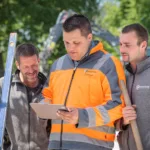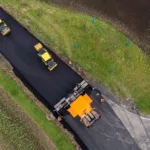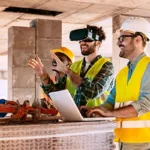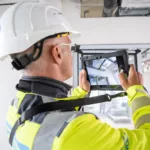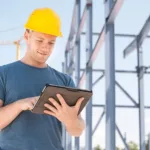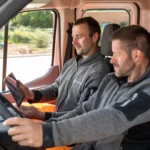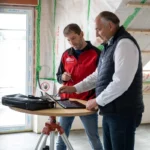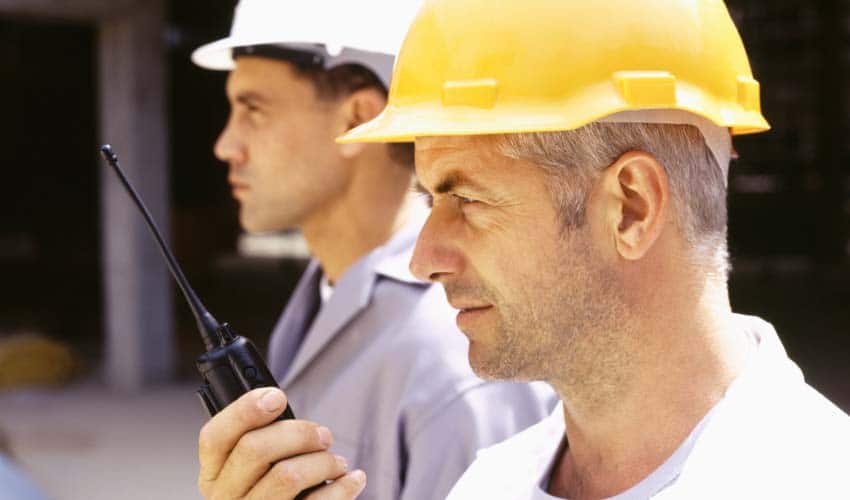
How to deal with language barriers and cultural differences on the construction site
Working on the construction site means working as a team. But how can team spirit be implemented when employees speak different languages and have completely different cultural backgrounds? Find out here how communication on the construction site works despite different native languages.
Construction sites in Germany, Austria and Switzerland are international and people of different nationalities, languages and cultures work together here. By and large, this works out well. Multinational teams get the job done – and have fun doing it as a team. This is also due to the fact that employees can perform the practical work on the construction site even if they do not speak the local language. So language is not a fundamental barrier to working on a construction site. Nevertheless:
Sometimes communication on construction sites could be improved. This does not work by itself, but by site managers actively making offers. Both sides benefit from this.
The difficulties that arise from a different cultural background and different languages can be solved with a little preparation.
Structured offers improve communication on the construction site even with language barriers
Just take the initiative to avoid problems in the first place. Good preparation is everything. It is particularly promising when both sides approach each other. In concrete terms, this means:
- Find out what languages are spoken and who you can communicate with.
- Work employees in well and brief them extensively.
- Encourage all employees to ask questions immediately if they are unclear to avoid misunderstandings.
- Many employees are afraid to admit mistakes or do not report themselves when something has gone wrong. Promote a positive error culture, then the team can fix errors promptly. All employees benefit from this, regardless of whether they are from Germany or abroad.
- Employees are strangers to each other and have few points of contact or prejudices? Common social activities such as the after-work beer or parties help against this.
- If employees have a fixed contact person to whom they can turn when they have questions or problems, this facilitates the exchange of information.
- Make all employees aware of cultural differences in terms of politeness or, for example, the way people talk about family and other topics. Actively inquire about this and approach employees.
- Different culture – different holidays: Understand that a colleague may be tired if he or she celebrated a party the day before.
Translation apps help international teams with language barriers on the construction site
You don’t need to hire an expensive professional translator for translations – it’s much easier to do it digitally today. Just feed the text into a free translation program and instantly you will get the translation. Programs like Google Translator translate into just about any language in the world, while the also highly recommended DeepL translates into English, French, Spanish, Portuguese, Italian, Dutch, Polish, Russian, Japanese and Chinese. The Google Translate app has other advantages as well. It translates entered text, but additionally also spoken language. Just click on the microphone icon in the app, speak into it, and the program will start translating.
Tip: The Google Translator app can also be used to translate text on a photo. This allows, for example, signs with text in an unknown language to be translated in seconds. The app is therefore a must-have on
construction site cell phones
of your employees – both foreign and German-speaking.
Bilingual foremen help communication in case of language barriers in international teams
Bilingual foremen are in a particularly good position to mediate between employees of different nationalities. They thus ensure greater work safety and better communication on your construction site. Studies have shown
that multilingual crew leaders and foremen make construction sites safer
. Therefore, it pays to strategically develop good bilingual or multilingual employees to fill this role. Because everything works better as a team – and the
Safety first – even on international construction sites
A central aspect on the construction site is safety. For this, it is important that the workers are familiar with the hazards and safety instructions.
Statistics with accident data on construction sites show that teams with foreign employees do not have more accidents.
Source: General Accident Insurance Institution, Vienna
This is good news. Nevertheless, it is important that all employees are fully informed about potential hazards and understand the safety instructions from the very beginning. Here you can help by giving your employees information in the local language.

With international teams you meet the shortage of skilled workers in Germany – despite language barriers
If you hire international employees, you effectively counter the shortage of skilled workers in the construction industry, which is prevalent in some sectors in Germany. Particularly in the skilled trades, there is a shortage of domestic skilled workers for electrical installation and assembly, machining technology, pipeline construction or welding technology, for example. And the trend is upward.
Employees from other EU countries make up for this shortfall. Citizens of the EEA states (i.e. the 27 EU member states plus Iceland, Liechtenstein and Norway) and Switzerland enjoy freedom of movement for employees, which means that they can be employed in a German company under the same labor, social and collective bargaining conditions as German employees.
The proportion of foreign workers on German construction sites is currently almost 20 percent. The share has increased from 7.7 percent in 2009 to 19.5 percent in 2019
Source: Main Association of the German Construction Industry e.V.
An international workforce has many advantages:
- You can fill positions that would otherwise have to remain vacant.
- You expand your applicant pool.
- Foreign employees are often characterized by above-average commitment.
- Experience shows that a mixed team solves tasks more creatively and better.
Image credits: Stockbyte/Stockbyte via Getty Images; Krisana Antharith/Shutterstock.com
